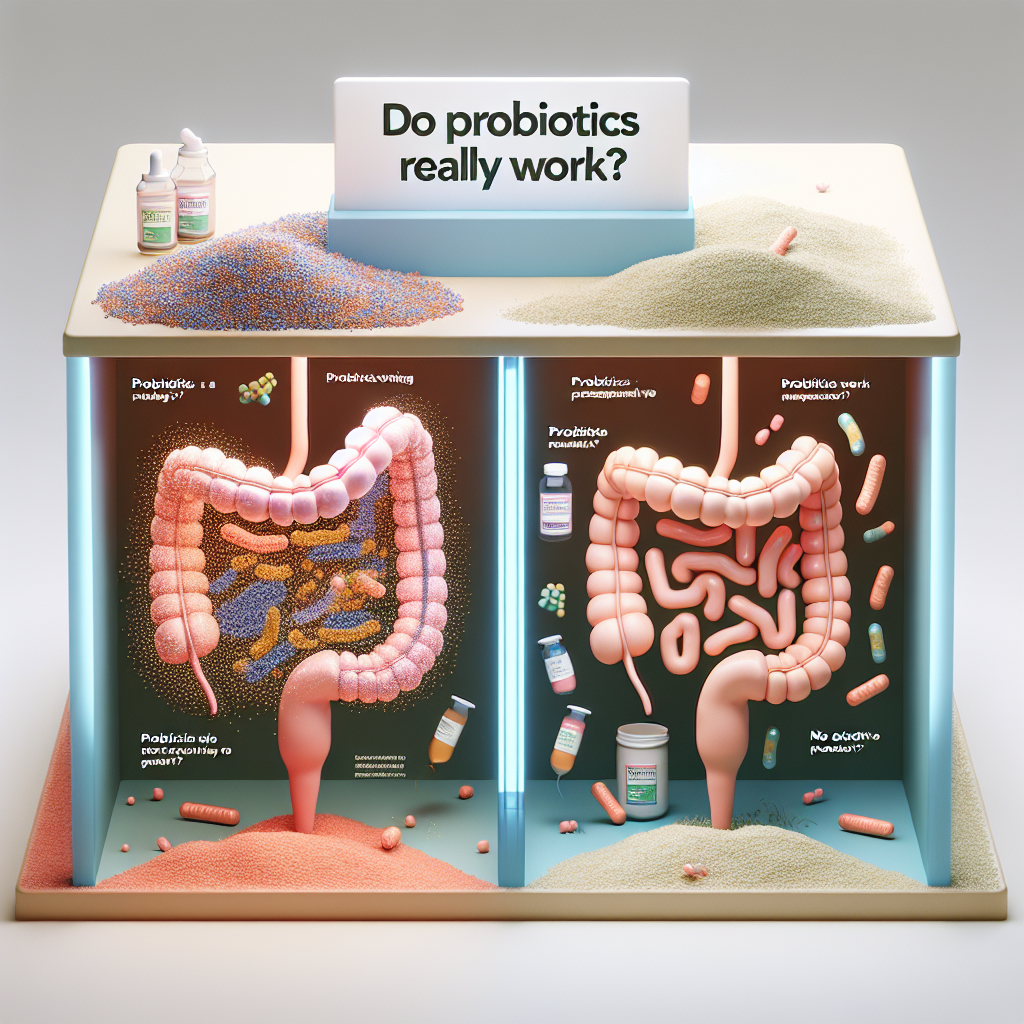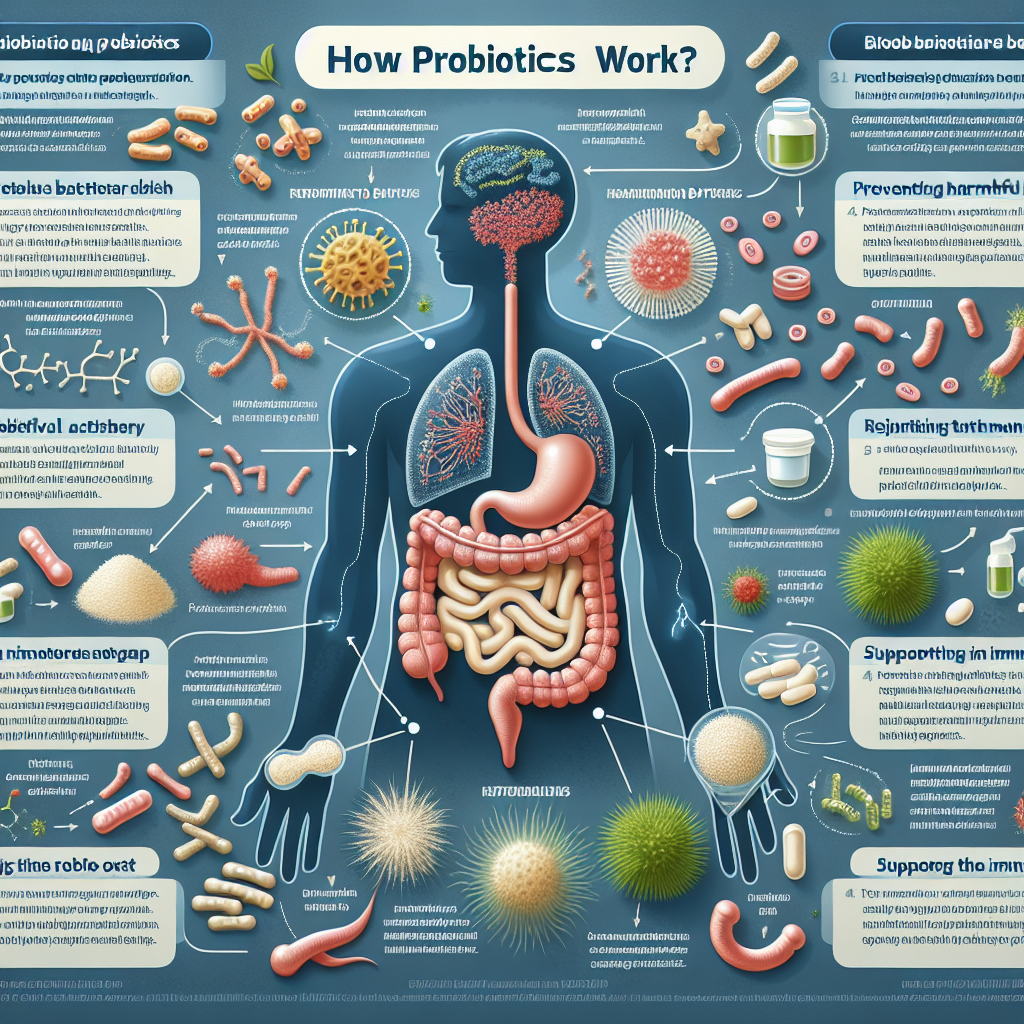Do Probiotics Really Work? Here’s What to Know

Discover the truth about probiotics and their effectiveness. Learn more about their benefits and how they can improve your health. Visit My Vibrant Vitality now to get all the information you need.
Unraveling the Truth: Do Probiotics Really Work?
Probiotics have been a buzzword in the health and wellness industry for quite some time now. These beneficial bacteria, found in various foods and supplements, are often touted as the magic bullet for a myriad of health issues, from digestive problems to mental health concerns. But do probiotics really work? Let’s unravel the truth.
The human body is home to trillions of microorganisms, collectively known as the microbiome. This complex ecosystem plays a crucial role in our overall health, influencing everything from digestion and immunity to mood and metabolism. Probiotics, which are live bacteria and yeasts, are believed to support this microbiome by replenishing and maintaining the balance of good bacteria in our bodies.
There is a growing body of scientific evidence supporting the health benefits of probiotics. Numerous studies have shown that certain strains of probiotics can help treat and prevent a variety of health conditions. For instance, certain types of Lactobacillus and Bifidobacterium have been found to alleviate symptoms of irritable bowel syndrome (IBS) and reduce the incidence of antibiotic-associated diarrhea. Other research suggests that probiotics may also support mental health by influencing the gut-brain axis, a bidirectional communication pathway between the gut and the brain.
However, it’s important to note that not all probiotics are created equal. The effects of probiotics are strain-specific, meaning that different strains have different effects. Therefore, a probiotic that works for one health condition may not work for another. Moreover, the efficacy of probiotics can also vary from person to person, depending on factors such as individual gut microbiome composition and overall health status.
Furthermore, while the potential benefits of probiotics are promising, the quality and regulation of probiotic products on the market can be a concern. Unlike drugs, which are strictly regulated by the Food and Drug Administration (FDA), dietary supplements, including probiotics, are not required to be proven safe or effective before they are sold. This means that the potency, purity, and quality of probiotic products can vary widely.
So, do probiotics really work? The answer is both yes and no. While there is substantial evidence to suggest that certain strains of probiotics can confer health benefits, the effectiveness of a probiotic can depend on numerous factors, including the specific strain used, the dose, and the individual’s unique physiology. Therefore, it’s essential to approach probiotics with a discerning eye.
If you’re considering adding probiotics to your health regimen, it’s advisable to consult with a healthcare professional first. They can provide guidance on the most appropriate strains and doses for your specific health needs. Additionally, it’s important to remember that while probiotics can support health, they are not a substitute for a balanced diet, regular exercise, and a healthy lifestyle.
In conclusion, while probiotics have the potential to offer numerous health benefits, more research is needed to fully understand their role in human health and disease. As we continue to unravel the complex world of the human microbiome, it’s clear that probiotics are an exciting area of research with the potential to revolutionize our understanding of health and wellness.
Probiotics: Understanding Their Effectiveness and Limitations

Probiotics have been a buzzword in the health and wellness industry for quite some time now. They are often touted as the magic bullet for a myriad of health issues, from digestive problems to mental health concerns. But do probiotics really work? The answer is not as straightforward as one might hope.
Probiotics are live bacteria and yeasts that are beneficial for your health, particularly your digestive system. We usually think of bacteria as something harmful, but your body is full of bacteria, both good and bad. Probiotics are often called “good” or “friendly” bacteria because they help keep your gut healthy. They can be found in certain foods, like yogurt and sauerkraut, or can be taken as dietary supplements.
The effectiveness of probiotics is largely dependent on the type and strain of the probiotic, the dosage, and the individual’s unique body chemistry. Some studies have found that certain types of probiotics can help with specific health conditions. For example, certain strains of Lactobacillus and Bifidobacterium have been found to help with irritable bowel syndrome (IBS) and certain types of diarrhea. Other research has suggested that probiotics may help with mental health issues, such as depression and anxiety, by influencing the gut-brain axis, a communication network between your gut and your brain.
However, it’s important to note that not all probiotics are created equal. There are many different strains of probiotics, and each strain can have different effects on the body. Furthermore, the amount of probiotics in a product can vary widely. Some products may not even contain the amount of probiotics listed on the label, or the probiotics may not be alive, which is necessary for them to be effective.
Moreover, while probiotics are generally considered safe for most people, they can cause side effects, especially in people with weakened immune systems or other serious health conditions. These side effects can include gas, bloating, upset stomach, and infection. Therefore, it’s always a good idea to talk to your doctor before starting any new supplement regimen, including probiotics.
In addition, while probiotics have been shown to have potential benefits, they are not a cure-all. They should not be used as a substitute for a balanced diet, regular exercise, and other healthy lifestyle habits. It’s also important to remember that while probiotics can help to maintain a healthy balance of gut bacteria, they are not the only factor that influences gut health. Other factors, such as diet, stress, and medication use, can also have a significant impact on the balance of bacteria in your gut.
In conclusion, while probiotics may offer some health benefits, their effectiveness can vary greatly depending on a variety of factors. More research is needed to fully understand the potential benefits and limitations of probiotics. If you’re considering adding probiotics to your health regimen, it’s important to do your research, talk to your doctor, and consider your individual health needs and circumstances. Remember, while probiotics may be a helpful tool in maintaining gut health, they are just one piece of the puzzle when it comes to overall health and wellness.
The Science Behind Probiotics: Do They Really Deliver Health Benefits?
Probiotics have been a buzzword in the health and wellness industry for quite some time now. These live bacteria and yeasts, often referred to as “good” or “friendly” bacteria, are touted for their potential benefits to our digestive system. But do probiotics really work? Let’s delve into the science behind probiotics to understand if they truly deliver health benefits.
Probiotics are naturally found in our bodies, but they can also be found in certain foods and supplements. They are believed to help maintain a healthy balance of gut bacteria, which is crucial for our overall health. This balance can be disrupted by factors such as poor diet, stress, and antibiotics, leading to an overgrowth of harmful bacteria. Probiotics are thought to restore this balance by crowding out harmful bacteria and replenishing the population of beneficial bacteria.
The science behind probiotics is complex and still evolving. However, a growing body of research suggests that probiotics may indeed offer several health benefits. For instance, some studies have found that certain strains of probiotics can help treat diarrhea, especially when it’s caused by certain antibiotics. Probiotics are also believed to help with other digestive issues such as irritable bowel syndrome (IBS), inflammatory bowel disease (IBD), and even Helicobacter pylori infections, which can lead to ulcers and stomach cancer.
Moreover, emerging research suggests that the benefits of probiotics may extend beyond the gut. Some studies indicate that probiotics may help boost the immune system, improve mental health conditions like depression and anxiety, and even aid in weight loss. However, it’s important to note that these findings are preliminary and more research is needed to fully understand the potential benefits of probiotics.
Despite the promising research, it’s crucial to remember that not all probiotics are created equal. There are many different strains of probiotics, each with its own potential benefits and drawbacks. The effectiveness of a probiotic can depend on several factors, including the strain used, the dose, and the individual’s existing gut bacteria. Therefore, it’s essential to choose a probiotic that’s right for you and your specific health needs.
Furthermore, while probiotics are generally considered safe for most people, they can cause side effects in some individuals. These can range from mild digestive symptoms like gas and bloating to more serious issues like infections in people with weakened immune systems. Therefore, it’s always a good idea to consult with a healthcare provider before starting any new supplement, including probiotics.
In conclusion, while the science behind probiotics is promising, it’s not definitive. Probiotics may offer several health benefits, particularly for digestive health, but more research is needed to fully understand their potential. Moreover, the effectiveness of probiotics can vary depending on the strain used, the dose, and the individual’s existing gut bacteria. Therefore, it’s important to choose a probiotic that’s right for you and to consult with a healthcare provider before starting any new supplement. Despite the uncertainties, one thing is clear: maintaining a healthy balance of gut bacteria is crucial for our overall health, and probiotics may play a role in achieving this balance.